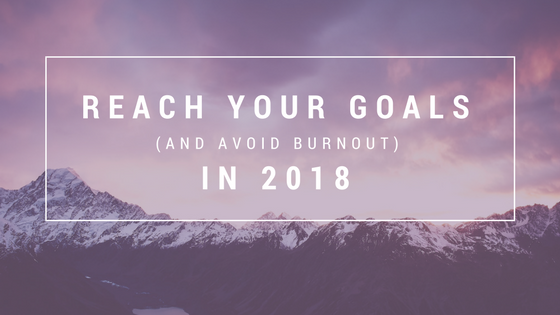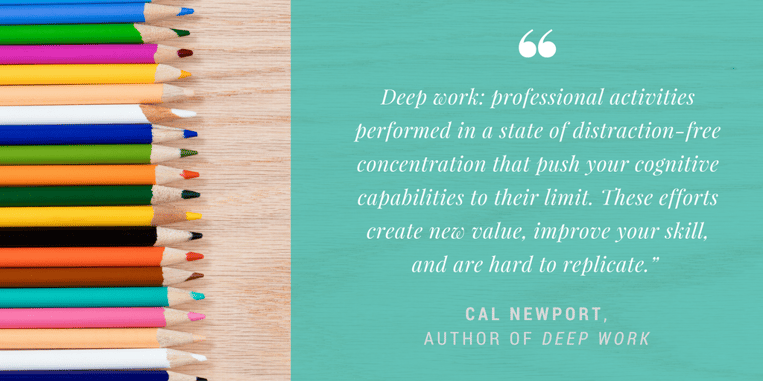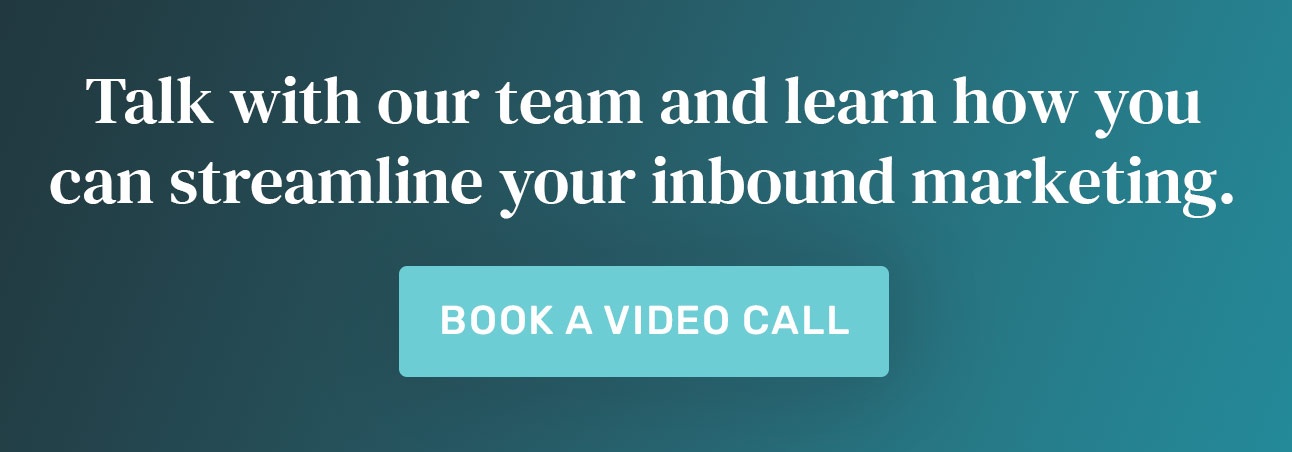4 Insights for Reaching Your Goals (and Avoiding Burnout) in 2018

January is once again upon us, and with the New Year comes a whole slew of resolutions that many of us will not keep (92% of us, in fact!). Like you, there are several changes I’d like to make and things I’d like to improve upon in the coming year. But the big problem that comes year after year for the majority of us is the inability to achieve the things we want. What if we could actually accomplish what we want to do, no doubt about it? How awesome would that be? Even better, what if we could reach those high aspirations without losing sleep, sacrificing sanity, or affecting our mood and relationships? It is possible.
In addition to our individual goals, the resolutions you might have for your business require a similar mentality if you want to be satisfied at the end of the year. For the purpose of this article, I’ll discuss some insights as they apply to marketing firms and agencies (as well as individuals), as we in the agency world understand the vicious cycle of setting lofty goals and getting pounded by burnout.
1. Place an emphasis on the journey, not the destination.
If you are familiar with goal-setting, you’ve heard the part about creating goals that are “SMART,” in which the “R” stands for “results-oriented.” Sure, the results are pretty important, but the process to get there might be even more crucial to reaching what you want to attain. A study of 4,000 college students found that those who aimed to finish a certain number of practice tests for an exam performed better on the exam than students who aimed to reach a specific letter grade. The practice tests were the process; the letter grade was the result.
The Oxford Dictionary defines “resolution” as “a firm decision to do or not to do something.” By setting objectives for yourself or your business that are centered around the journey rather than the destination, you’re much more focused on the “doing” or “not doing” instead of where those actions might get you. You are required to craft (and stick to) a concrete, well-thought-out plan. Plus, you remain more in tune with your present actions rather than a distant day in the future, which increases the feeling of urgency of your goal—and might even make it more enjoyable.
2. Rethink your distribution and scheduling of “work” time.
If you work in a similar setting as my marketing firm in Denver, you most likely work standard 9-5 hours. That typically means a mix of continual low-intensity work (your “to-do’s” for the day) and various distractions, like impromptu meetings, email, and website wandering. The problem with this model is that it has the tendency to pull you away from the structured plan you laid out to reach your goals. When you know you have 8 hours a day to “work,” what you really end up doing is filling up those hours with various administrative tasks and lower quality, less creative production.
On the other hand, if you schedule out short (1-3 hours) spurts of “deep work,” meaning zero distractions, high-velocity thinking, and deliberate completion of what you set out to finish, the end result is higher in quality and you are more satisfied. Rather than feeling “busy,” you feel productive. Structure your tasks and goals around doing better, not doing more. And physically schedule this time out on your calendar! We always carve out times for our meetings and phone calls, but not for periods of deep concentration. Block these chunks off on your planner or calendar and prepare your mind for what will hopefully become a “flow state” of work time.

3. Make time to detach yourself from your goals.
Just as periods of deep focus are crucial in making progress towards your goals, times of detachment and recovery are vital for keeping your brain, body, and psyche fresh. That might sound obvious, but how often do we consciously and wholly refrain from thinking about anything work-related when we aren’t working? Surely, you have found yourself lying in bed in night mulling over what you did or didn’t get done during the day, or stewing over a tense meeting with a client. Psychologists posit that the most essential parts of recovery only occur during true mental detachment.
As a remote employee—and a millennial—I’m definitely guilty of holding onto work even in times when I’m technically off the clock. Many millennials boast the ability to work “whenever” and multi-task as a point of pride. Psychologists say that this should not be a point of pride—it should be something we strive to stay away from at all costs. When you’re working towards your goal, you’re working; and when you’re playing, you’re free to let your mind and body be fully present and engaged where you are. As Stuart Brown said in his TED talk in 2008, “Nothing fires up the brain like play.” 
4. Alter your mindset surrounding your goals.
Thinking about your goals is the first step to completing them, and it’s an important one to master. How you view your goals has a significant impact on whether or not you reach them—for example, believing that your marketing firm is in fact capable of reaching a certain amount of revenue per year and having true passion and perseverance to get there. Or reframing your daily to-do’s to increase your focus on the immediate reward rather than the long-term result. Research in many fields has shown that individuals are much more motivated by a short-term benefit, or an immediate reward, as opposed to a reward much more in the future (i.e. a desire to avoid heartburn from unhealthy foods rather than wanting to just “lose weight”). Shifting your mindset to reframe the process of reaching your goal can make getting there a major priority rather than another dropped resolution.
Could 2018 be the turning point for your marketing firm? Or you as an individual? It is possible to do more and achieve greater things without spreading yourself too thin. Take a step back and look at how you’re going after your dreams—it might be time to view it from a different perspective.

January 16, 2018
